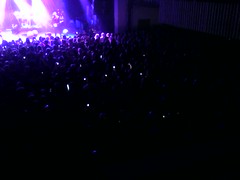Back in 2004, I began experimenting with
ways to track and manage my many projects. Originally I used Excel, which was both easier and cheaper than the desktop project management software available. But as I continued to manage projects at the
CWRL, I found that I needed something that would work collaboratively across teams -- something that didn't need installing, something that could grant permissions to the appropriate people and that could provide dashboards for people working on a given project.
Although I experimented with features using the CMS we've adopted in-house,
Drupal, I found that it wasn't flexible enough for our needs. Then I discovered
Basecamp, a brilliant web app that did the things I needed. Mostly.
One of the things that worried me about Basecamp was the fact that data -- including some fairly private data -- were stored on Basecamp's servers. Yes, you could opt to store files on your own servers, but that required some tricky password work. And the wiki was run as a separate app, not fully integrated. Most vexingly, you have
the "Your Basecamp or Mine?" problem: if two groups use Basecamp, the project has to live in one Basecamp account or the other, making a unified dashboard impossible. Finally, you have to pay for it.
So I turned to the open source workalike
activeCollab for CWRL business. activeCollab is pretty decent, it runs on your own server with MySQL+PHP, and it's of course free. It also has some additional functionality, such as free tagging, which made it attractive to the CWRL. On the other hand, it requires more centralized administration, it's visually clunky, and it has some dashboard issues of its own (for instance, you can't get an intermingled, chronological list of upcoming milestones). And again, it's not distributed. You still suffer from the "Your Basecamp or Mine" problem.
Well, a lot of things have been happening in this sector recently. In no particular order, here are some other web-based project management systems, in no particular order, with brief commentary based on my initial impressions. If these impressions are incomplete, please feel free to follow up in the comments.
Wrike.
- The pitch: Like Basecamp, but with Gannt charts and more email-centric
- The pros: Email-centric, so projects more or less live in a familiar unified environment; milestones can belong to multiple projects.
- The cons: Interface is complex, with a pane just for folders and lots of icons. I'm not a big fan of folders and icons: they tend to increase clutter and decrease information density.
GoPlan- The pitch. Like Basecamp, but with IM notifications, in-project chat, calendar, project blogs, ticketing system.
- The pros. Additional features, simple interface.
- The cons. Still Basecamp-plus. Integrates a lot of tools, and I'm worried about jack-of-all-trade applications.
Etelos Projects- The pitch. Leverage your Google Docs and Calendar.
- The pros. Understands project management as a set of services distributed across providers. Integrates it into where you live.
- The cons. I've thought about it a lot, and have concluded: no way in hell am I going to provide my Google password to a third party. Your threshold may be different.
MyOffice.- The pitch. A Facebook app that does light project management.
- The pros. As far as I know, this is the only one to solve the "Your Basecamp or Mine" problem. Dashboard integrates with Facebook dashboard, so you can get a panoramic view of projects and social life; since your project is populated with Facebook friends, you can see their personal status along with their project status. Free. Leverages Facebook contacts, messaging, and eventually levels of access once Facebook rolls these out.
- The cons. Currently underdeveloped; unclear how this will be monetized beyond ad revenue; unclear how secure the data are or how secure Facebook's data are.
Nozbe- The pitch. Project management, task management in a GTD framework.
- The pros. If you're into GTD, this software will reinforce the GTD concepts and ways of working. True mobile integration as well as clever printing formats.
- The cons. From a brief look, seems more focused on the GTD aspect than the project management aspect.
TeamWork Live- The pitch. Like Basecamp, but relatively distributed; generates useful reports; team- rather than project-oriented. See my recent review.
- The pros. Nice layout and functionality. Nice additions to basic Basecamp functionality.
- The cons. "Team" can be confusing. Name can be confusing too -- sounds like a Microsoft product.
Overall, there are some great contenders here. Currently I am most intrigued with the least developed of these, MyOffice, because it provides a unified view of project and social landscapes and because it is potentially distributed in a way that I thought Google was going to achieve in February. MyOffice sees PM as a service that can be integrated in other web services rather than as a standalone application. On the other hand, this architecture doesn't let it do some of the things that the other project management systems can.
Ultimately, though, the CWRL will stick with activeCollab for the forseeable future, simply because it lives on our servers and we can control the security. For my personal projects -- well, there's a lot of options to choose from.
Comments?






